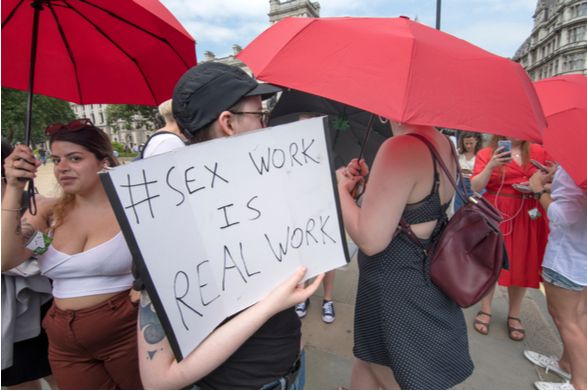This week, Teen Vogue promoted a column by a doctor calling for the legalization of sex work. This would generally go unremarked upon — similar arguments appear across the media landscape, and even in the Democratic presidential campaign — but for her characterization of prostitution to the young readers of the magazine as a mere career choice, as valid as any other.
Nestled between teen-friendly fluff pieces on fashion tips and celebrity tidbits, the column compared selling your body for cash to the practice of medicine — just another profession, just another choice. In fact, supporting prostitution is described as “the litmus test for intersectional feminism.” “When you think about it,” the author asks, “aren’t I a sex worker? And in some ways, aren’t we all?”
Teen Vogue is just the latest example of a trend that treats sex work as a valid career to be marketed to young girls. In Stockton, California, a high school newspaper recently caused a stir by printing a favorable profile on a senior who makes money by appearing in pornography. The girl says she is estranged from her parents and short on cash, but perhaps such “opportunities” will soon be part of career counseling.
Good sexual decisions require good judgment
And given the way many people in our culture talk about sex, it’s hard to argue the opposite. If consent is our only moral lodestar, and all consensual sexual activity is good, healthy exploration, then by what standard should we say that an 18-year-old girl shouldn’t make an easy buck by consenting to have her body be used for the night? Saying so would be that most despised of traits — judgmental.
But it’s judgment we’ve lost as a society; the good judgment to determine good sexual decisions from bad. Consent may be able to tell us when sex is legal (sometimes), but it cannot tell us when it is good. The social science tells us that casual sex, let alone its formalization as a “career,” is bad for women and girls’ — and to a slightly lesser extent, men and boys’ — emotional well-being and mental health.
In its summary of hook-up culture, the American Psychological Association noted a study that found 78% of women and 72% of men who had an uncommitted sexual encounter experienced feelings of regret. Multiple studies have found an association between casual sexual encounters and indicators of poor mental health, like depression, suicidal ideation, and drug use. As Caitlin Flanagan rightly asks in The Atlantic, “when did we lose the ability to interpret the signs of a girl in bad trouble?”
Undermining human trafficking victims
Of course, many sex workers don’t even get the chance to meaningfully consent. Like the readers of Teen Vogue, many victims of trafficking are minors. At least 28% of trafficking victims worldwide are children, according to the United Nations, and the vast majority of all human trafficking victims overall are women and girls. Among those trafficked in the United States, the Department of Justice puts the percentage of victims who are 17 years old or younger at 54% and nearly 95% of sex trafficked victims are female.
This is not “real work,” it is modern-day slavery. The empowered “real work” imagined by Teen Vogue means nothing to the daily miseries of these girls.
In fact, instead of standing up for these trafficked girls, Teen Vogue has published articles worrying about the adverse effect of legal protections for them on adult sex work. Their priority seems to be always in favor the fullest range of sexual expression for adults, rather than recognizing its impacts on the well-being of girls.
The irony is that exactly at the moment a magazine geared toward teens chose to present sex work in a positive light to teens, young women are looking at the greatest panoply of career opportunities before them in human history. Female unemploymentis at its lowest ebb since the 1950s, and the gig economy is making it possible for women to balance the demands of family and career — a balance women say they want — more creatively than in the past.
It’s fine to have a discussion among adult citizens about whether decriminalizing prostitution would mitigate some of its many harms, especially to the girls and women who enter the profession out of desperation, or with no choice at all. But we don’t have to present selling sex as a valid career choice in the pages of a fashion magazine for young girls to have that debate.


